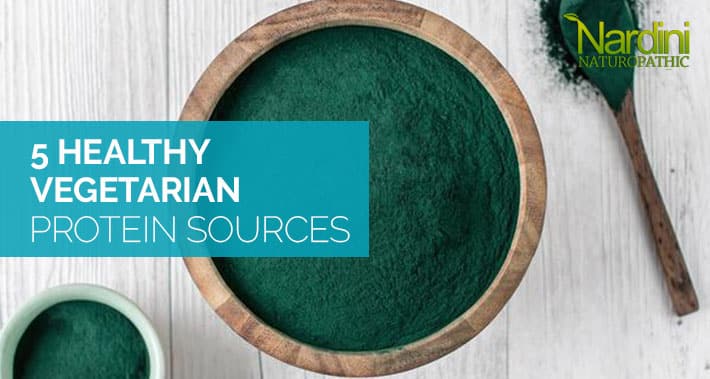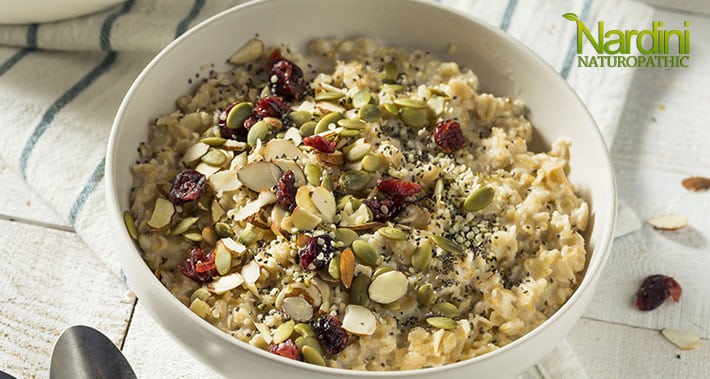If you’ve ever heard the term “complete protein” – perhaps in relation to quinoa – you may know that this denotes a food that has all nine of the essential amino acids that we need.
These can be found in greatest quantities in meat, dairy, eggs or seafood, but they can also be found in non-animal-based sources, such as plants.
When it comes to vegan diet nutrition, a naturopathic doctor can help guide you in the right direction to avoid some of the potential pitfalls.
What sort of pitfalls?
Keep reading.
How Much Protein Do You Actually Need?
It turns out we probably don’t need as much as we think – only a meat piece the size of your palm, for example. If you’re eating too much protein, your body will convert the excess to glucose sugar.
What we need equates to roughly .5 to 1 gram of protein per pound of lean body weight, but this will vary based on age, gender, weight, and activity level.
What Is Protein Combining?
This is the concept of ensuring that every meal includes the nine essential amino acids in some combination of meat and non-meat sources.
However, your stomach doesn’t care, and it doesn’t know the difference between an amino acid from lunch and a different one from dinner. So long as it gets them throughout the meals of the day, you’re in good shape.
This is the reason most naturopaths will recommend a wide variety of fruits, veggies, nuts, and seeds – because between them you’ll end up with the full complement, as well as many other vital nutrients that your body needs.
Top 5 Healthy Vegetarian Protein Sources
Although you may not have heard of all of them before, here are five of the best plant-based protein sources.
1. Tempeh
Tempeh, like tofu, is made from soybeans, but it has much more of a cake-like texture, and it has its own unique taste.
You may have heard that soy is difficult for your body to digest, and this is true, but only in its unfermented forms.
Tempeh is fermented, which helps break down any phytic acid from the soybeans; this makes the nutrients in the tempeh easier to digest, preserving your gut biome.
2. Spirulina
Spirulina is derived from algae, and can benefit your body and brain in so many ways:
• It is packed with vitamins, minerals and other nutrients
• It has powerful anti-oxidant and anti-inflammatory properties
• It helps reduce the “bad” LDL cholesterol and triglycerides, while raising the “good” HDL cholesterol – thereby reducing your risk of heart disease
• Several studies have shown evidence that spirulina can reduce cancer occurrence and tumor size, specifically in oral cancer – and these properties may impact other cancers
• It can reduce the impact of allergies
• It can also help to reduce your blood pressure, according to several studies
• It may help to reduce the occurrence of anemia
• It can help improve muscle strength and endurance
3. Hemp Hearts
Hemp hearts are the edible interiors of the seed that hemp grows from, but eating it won’t get you high, and you certainly won’t fail a drug test if you start including it in your diet, as it has almost undetectable levels of THC.
Hemp hearts are another perfect protein, and can easily be added smashed to burgers, blended into shakes, or sprinkled onto salads.
4. Nutritional Yeast
Nutritional yeast is an inactive type of yeast fabricated from sugarcane and beet molasses; it’s yellow in colour and usually comes in flakes that are used like a condiment.
It has a nutty, cheesy flavour, which is why it’s often turned into vegan cheese-like products.
Other benefits of nutritional yeast include:
1. High in protein
2. Helps improve digestion
3. High in Vitamin B12
4. Preserves immune function
5. Has antibacterial and antiviral properties
6. Supports a healthy pregnancy
7. Promotes healthy nail, hair and skin
5. Natto
Natto is a traditional Japanese breakfast food – a fermented soybean with a taste and smell that could remind someone of old French cheese.
Nevertheless, it is full of nutritional benefits:
• One cup produces a whopping 31 grams of protein (by comparison, the same amount of beef has about 32 grams of protein)
• It’s high in Vitamin K, important for bone and cardiovascular health
• It’s packed with probiotics, helping your digestion
Other Plant Based Sources Of Protein
Here are some of the most popular plant-based sources of protein – get a variety of these in order to consume all of the essential amino acids that your body needs.
• Almonds and almond butter
• Walnuts
• Brazil nuts
• Maca powder
• Flaxseed
• Chia seeds
• Green peas
• Spinach
• Avocados
• Broccoli
• Brussel sprouts
• Artichokes
• Asparagus
Call Nardini Naturopathic
To get help understanding how much protein you need in your diet, and how to make sure your diet sustains that, call Nardini Naturopathic.
Whether you’re vegan, vegetarian, or merely reducing your meat intake, I can help you make sure you get all the protein you need for your lifestyle.
Call me, Dr. Pat Nardini, ND, today.
If you have questions about naturopathic medicine, or you’d like to take your first step into the world of naturopathy, contact us at Nardini Naturopathic, and let’s book an appointment.
Yours in health,
Dr. Pat Nardini, Naturopathic Doctor
320 Danforth Ave suite 206,
Toronto, ON, M4K 1N8
-https://g.page/NardiniNaturopathicDanforth
Dr. Pat Nardini, ND is a licensed doctor of naturopathic medicine in Toronto, Ontario. He offers science based natural health solutions with a special focus on thyroid conditions.


